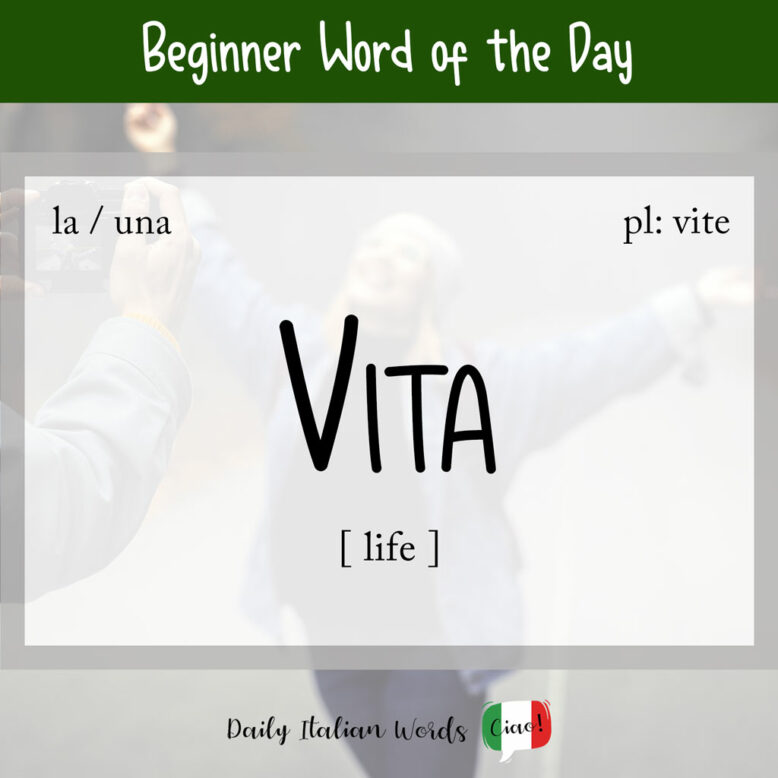The Italian word for life is vita (feminine, plural: vite). It shares the same root as the English words vital and vitamin, which is the Latin vita of the same spelling and meaning.

In almost every sense of the word, it mirrors its English equivalent barring a few exceptions.
For starters, it can refer, not only to (1) the condition that distinguishes plants and animals from inorganic matter, but also (2) the existence of an individual being.
(1) Qual è l’origine della vita?
What is the origin of life?
(2) Il soldato ha perso la vita durante la guerra.
The solider lost his life during the war.
Additionally, it denotes (3) the period between birth and death of a living thing, as well as (4) the period during which something inanimate continues to exist, function or be valid.
(3) Ha trascorso tutta la sua vita in Toscana.
She spent her whole life in Tuscany.
(4) Come posso prolungare la vita della nostra lavatrice?
How can I prolong the life of our washing machine?
In a metaphorical sense, it refers to (5) the vitality and energy of a living thing or something made up of living things.
(5) Il mio cane è pieno di vita.
My dog is full of life.
It is also (6) a synonym for a person or human being, especially in circumstances surrounding their death.
(6) Molte vite furono perse in quel tragico incidente.
Many lives were lost in that tragic accident.
Finally, it can indicate a way of living as in the examples below:
- una vita felice = a happy life
- una vita agitata = a stressful life
- una vita serena / tranquilla = a peaceful life
- la bella / dolce vita = the good life
- una vita da cani = difficult, miserable life (lit. dog’s life)

Some verbs you will frequently see used with vita include:
- essere in vita = to be alive, to live
- perdere la vita = to lose one’s life
- togliersi la vita = to take one’s own life
- godersi la vita = to enjoy life
- salvare la vita (di/a qualcuno) = to save (somebody’s) life
- salvarsi la vita = to save one’s own life
- dovere la vita (a qualcosa/qualcuno) = to owe one’s life (to something/someone)
- mantenere in vita = to keep alive
Combined with the verb dare, there can be multiple meanings:
- dare vita a (qualcosa) = to create (something)
- dare la vita a (qualcuno) = to give birth
- dare la vita per (qualcuno / qualcosa) = to sacrifice one’s life for (somebody/something), with a literal or figurative meaning
Non dare segni di vita, which means to not show any signs of life, refers either to a person or animal that looks dead, or a person that hasn’t been in touch for a while. It can also be used in a humorous way to talk about a piece of equipment that has stopped functioning.
Il mio telefono non dà più segni di vita. Mi sa che è ora di cambiarlo.
My phone has died. I think it’s time to replace it.
If you happen to know a secret agent, he most certainly leads a double life. If that secret agent is Italian, you can tell him that he leads a doppia vita. Or if you know a senator for life, then you know a senatore a vita.
One situation in which vita does not translate as life is when referring to one’s living, as in the income one makes or the means of earning it. For example:
- la vita sta aumentando = the cost of living is rising
- guadagnarsi la vita = to earn one’s living
For the latter, you can also say guadagnarsi da vivere (to earn one’s living, with the verb to live) or guadagnarsi la pagnotta (lit. to earn one’s daily bread).

Popular expressions with ‘vita’
Su con la vita!
Literal translation: Up with the life!
English meaning: Cheer up!
Essere tra la vita e la morte
Literal translation: To be between life and death
English meaning: To fight for one’s life
Avere vita breve
Literal translation: To have a short life
English meaning: To be short-lived
Avere sette vite come i gatti
Literal translation: To have seven lives like cats
English meaning: To be made of tough stuff
Passare a miglior vita
Literal translation: To pass to a better life
English meaning: To go to a better place, to die
Finché c’è vita c’è speranza
Literal translation: As long as there is life, there is hope
English meaning: As long as there is life, there is hope
Sapere vita, morte e miracoli (di qualcuno)
Literal translation: To know the life, the death and the miracles (of someone)
English meaning: To know everything / to know the life and times (of someone)
Heather Broster is a graduate with honours in linguistics from the University of Western Ontario. She is an aspiring polyglot, proficient in English and Italian, as well as Japanese, Welsh, and French to varying degrees of fluency. Originally from Toronto, Heather has resided in various countries, notably Italy for a period of six years. Her primary focus lies in the fields of language acquisition, education, and bilingual instruction.


